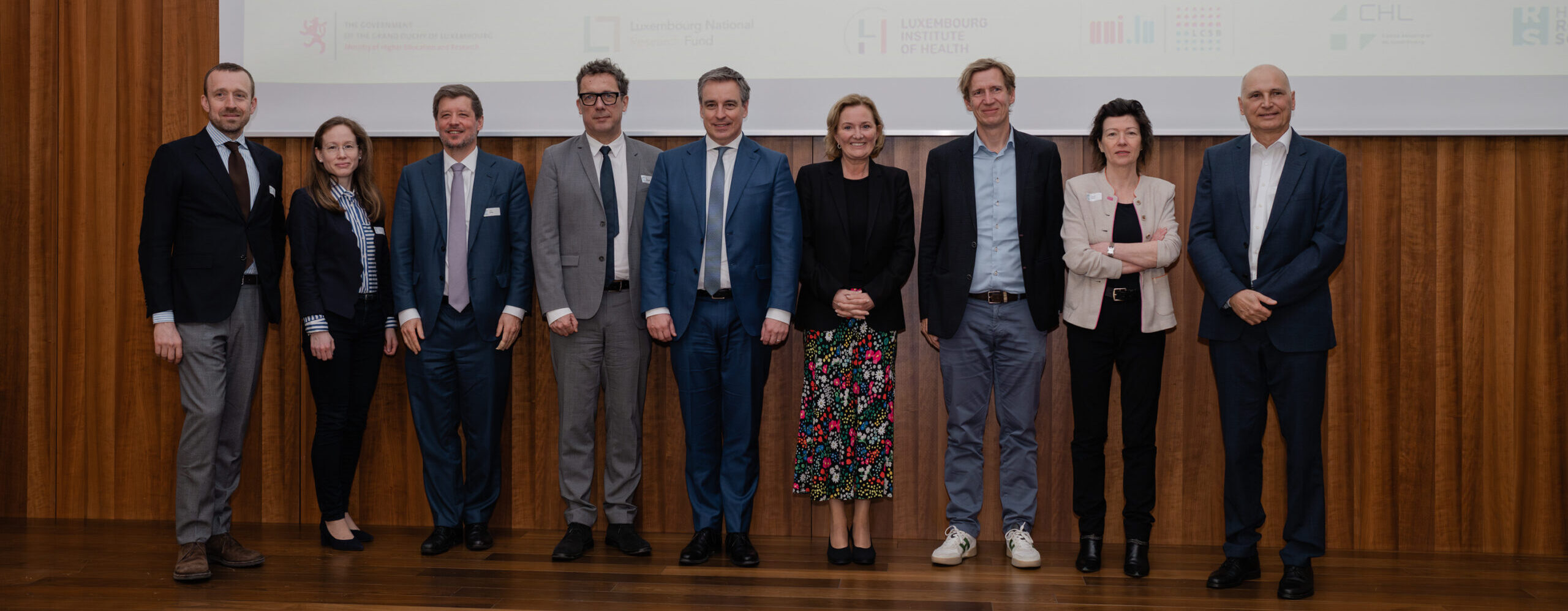Inaugurating a new initiative to foster AI-driven precision medicine via data federation, standardisation, and interoperability.
On 27 April, Clinnova, an international project involving clinicians and researchers from Luxembourg, France, Germany and Switzerland was officially launched at a kick-off ceremony attended by the Ministers of Higher Education & Research and Health. The initiative aims to realise the benefits of precision medicine for treatment decisions through data federation, standardisation, and interoperability. The project is supported jointly by the FNR’s NCER programme, the Grand Est Region, the Canton of Basel as well as the State of Baden-Württemberg and will establish a shared launchpad for medical AI algorithm development in the heart of Europe.

Dr Marc Berna (Directeur général, HRS), Dr Jasmin Schultz (LIH), Dr Marc Schiltz (CEO, FNR), Dr Ulf Nehrbass (CEO, LIH), Claude Meisch (Minister of Higher Education and Research), Paulette Lenert (Minister of Health), Dr Gregor Baertz (President of the Board, LIH), Dr Simone Niclou (Vice-Rector Research, UNI), Dr Romain Nati (Directeur général, CHL).
Artificial intelligence (AI) holds huge potential in the field of healthcare but its realisation faces challenges, notably in the context of data enabling and the ability to build appropriate clinical studies. The Luxembourg part of the Clinnova project is in the framework of the National Centres of Excellence in Research (NCER) programme of the FNR and is led by the Luxembourg Institute of Health (LIH) in partnership with the University of Luxembourg, the Centre Hospitalier du Luxembourg, and the Hopitaux Robert Schuman.
Conceived as a precision medicine initiative
To date there are no straightforward methods available to decide which drug to prescribe to which patient. With new drugs coming on the market in a steady flow, this leaves physicians and patients with a concrete problem: the wrong therapy may extend the disease burden while invoking an unnecessary cost on the social system. Clinnova was conceived as a precision medicine initiative that tackles these challenges on three levels.
Generating benefits for patients and physicians on three diseases
On the first level, Clinnova focuses on generating benefits for patients and physicians on three diseases: inflammatory bowel disease, rheumatoid diseases and multiple sclerosis. With an emphasis on data quality and standardisation, the goal is to develop effective AI algorithms that can support physicians in prescribing the right drug to an individual patient at the right time. Furthermore, these data can accelerate translational research into disease causes, which can further affect patient care.
Bridging the worlds of biomedical research and healthcare
On the second level, Clinnova will bridge the worlds of biomedical research and healthcare by fostering critical infrastructure development in Luxembourg. It will undertake the necessary steps to assure data interoperability and integration in this infrastructure concept.
Federating precision health borders
Finally, on the third level, Clinnova will federate precision health data across borders. The Clinnova team in Luxembourg has teamed up with Universities and clinical centres in Baden-Württemberg in Germany, the Grand Est region in France, and the region of Basel in Switzerland to invest in similar Clinnova precision health programmes, thereby linking the established IT infrastructures. In this vein, the Clinnova partners are building a federated precision health network across Europe.
Fostering AI-driven precision medicine at an unprecedented scale
Overall, AI-driven solutions for healthcare require both infrastructure investment and coordination between clinical institutions.
“We envision that in such a data-enabled environment, the translation and application of biomedical research towards patients and their unmet needs will become a seamless routine process,” says Dr Jasmin Schulz, chief coordinator of Clinnova at the LIH. The project’s stakeholders also believe that translational research initiatives focused on patients will evolve to become a major driver for fundamental research, thereby increasing the amount of therapeutic possibilities for patients in the future.
“We believe that Clinnova’s mission to utilise data science and AI to reshape healthcare aligns well with the national priorities of Luxembourg. The Ministry of Health fully supports this ambitious goal to become a leading digital economy and further develop personalised medicine,” Paulette Lenert, Minister of Health.
On the national, trans-sectorial level, the Luxembourg National Data Service has also been created as a catalyst for the national research and innovation ecosystem to fully utilise the potential of data. In this context, Clinnova was chosen as one of the use cases for the healthcare sector.
“By leveraging data federation, standardisation and interoperability, Clinnova is poised to foster AI-driven precision medicine at an unprecedented scale. By utilising international and interdisciplinary expertise anchored within the national priority of personalised healthcare, the project fully aligns with the Luxembourg National Research and Innovation Strategy. Clinnova will significantly contribute to Luxembourg’s research environment and the expansion of its positive image throughout the world,” – Claude Meisch, Minister of Higher Education and Research.
About the FNR’s NCER programme
The National Centres of Excellence in Research (NCER) programme was established by the Luxembourg National Research Fund (FNR) and provides a structuring framework and funding instrument to bundle research excellence around a mission of significant societal relevance by encouraging high-level transdisciplinary research and inter-sectoral collaboration.
The first successful NCER project was launched by the FNR in 2015 on the topic of Parkinson’s disease. A second NCER project was initiated earlier this year in the field of Financial Technologies. NCER projects should become internationally recognised examples of best scientific practice, in regards to the outcomes and impact of research as well as in the way research is carried out. The funding of an NCER project by the FNR is contingent on a rigorous evaluation by a panel of international experts and runs for a maximum of 8 years.